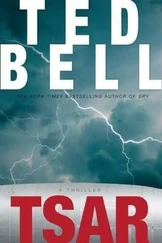Ted Bell - Phantom
Здесь есть возможность читать онлайн «Ted Bell - Phantom» весь текст электронной книги совершенно бесплатно (целиком полную версию без сокращений). В некоторых случаях можно слушать аудио, скачать через торрент в формате fb2 и присутствует краткое содержание. Жанр: Триллер, на английском языке. Описание произведения, (предисловие) а так же отзывы посетителей доступны на портале библиотеки ЛибКат.
- Название:Phantom
- Автор:
- Жанр:
- Год:неизвестен
- ISBN:нет данных
- Рейтинг книги:3 / 5. Голосов: 1
-
Избранное:Добавить в избранное
- Отзывы:
-
Ваша оценка:
- 60
- 1
- 2
- 3
- 4
- 5
Phantom: краткое содержание, описание и аннотация
Предлагаем к чтению аннотацию, описание, краткое содержание или предисловие (зависит от того, что написал сам автор книги «Phantom»). Если вы не нашли необходимую информацию о книге — напишите в комментариях, мы постараемся отыскать её.
Phantom — читать онлайн бесплатно полную книгу (весь текст) целиком
Ниже представлен текст книги, разбитый по страницам. Система сохранения места последней прочитанной страницы, позволяет с удобством читать онлайн бесплатно книгу «Phantom», без необходимости каждый раз заново искать на чём Вы остановились. Поставьте закладку, и сможете в любой момент перейти на страницу, на которой закончили чтение.
Интервал:
Закладка:
So be it.
It shall be done.
I am become Death.
The Destroyer of Worlds.
Monsieur Gaston de Montebello, the elderly director of the Institut de Scientifique Francaise in Paris, hung up the telephone. He looked at his watch and gazed wistfully up toward the ceiling for a few moments. He closed his dark, sunken eyes, the heavy lids fluttering, and then opened them wide.
“London,” he said.
He snapped his old leather briefcase shut after adding a few necessary items and stood up. Then he headed for his office door, removed his raincoat, and slipped into it. Grabbing his hat, he placed it, somewhat askew, atop his mop of fluffy white hair, stepped outside his office, and pulled the door shut behind him. His red-haired secretary, Marie-Louise, looked up at him in surprise.
“Monsieur Gaston, your eleven o’clock appointment is still waiting in the foyer. The minister and a member of his cabinet. They are here for the presentation ceremony, as you know-the Lafitte Award for Lifetime Achievement in Advanced Artificial Intelligence. Have you forgotten? He is quite upset at being treated with such-”
Gaston paused a moment beside her desk, gazed thoughtfully into space, and then smiled at her. He’d forgotten how much he admired her flaming red bouffant, her pouty red lips and big blue eyes.
“London,” de Montebello said to her before he turned and walked away.
“But, Monsieur, surely you-Monsieur Gaston!”
He’d already passed through to reception and out to the foyer. He was standing by the elevators, randomly pushing buttons. Marie-Louise rose from her desk and hurried out to reception where the red-faced minister and his party were waiting, both of them staring at her incredibly rude employer in openmouthed amazement.
“Monsieur le Ministre,” she said to the man on the divan, “I am so terribly sorry. Perhaps the director is ill. Forgive me a moment; I’ll speak to him.”
She went over to the elevator bank where Gaston de Montebello was staring with glazed eyes at the flickering floor numbers above the door. Number five illuminated and the doors slid open with a soft ding.
“Monsieur! Monsieur! The minister is here to see you!”
De Montebello entered the elevator, turned to face her, tipped his fedora, and said with a smile, “London.”
Exiting his building, he walked out into the rue d’Argent, smiling at passing taxi drivers and swerving, screeching passenger cars. Luckily, a taxi pulled over before the old man was run down in the street. He opened the door and climbed into the back.
“London,” he said to the driver’s amazement.
“Londres? Gare du Nord, peut-etre?” the surprised driver asked. “Le TGV, perhaps?”
“Mais oui. A Londres.”
TGV was the Train Grande Vitesse (high-speed train) operated by the French national rail operator SNCF. The TGV set a record for the fastest wheeled train in 2007, reaching a speed of 357.2 mph. The trains are powered by electricity from overhead lines and connect continental Europe to St. Pancras Station in London via the Channel Tunnel. Paris to London travel time on the TGV is a mere two hours, fifteen minutes.
Because TGVs travel far too fast for their drivers to see and react to traditional trackside signals, an automated system called TVM, track-to-train transmission, is used for signaling. All critical information is transmitted to trains via electrical impulses sent through the rails. TVM provides drivers with critical information: speed, target speed, and, most important, stop/go indications, all transmitted directly to the train’s driver via dashboard-mounted instruments.
This high degree of automation does not completely eliminate driver control. An onboard computer system generates a continuous speed control curve in the event of an emergency brake activation, displaying Flashing Signal Aspect on the train’s speedometer. Whenever the flashing signal is displayed, the driver is required to apply the brake manually to slow or stop the train. In a true emergency, a catastrophic failure of automatic braking, a white lamp is illuminated above the control board to inform the driver. The driver acknowledges this authorization by using a button that disables automatic braking and puts total control in the hands of the driver.
Monsieur de Montebello exited the taxi at the Gare du Nord and made his way to the TGV ticket office on the second level. He saw his sleek train waiting at the platform, the familiar blue-and-silver livery, smiled, and said to a passerby, “London.” Having acquired his one-way ticket, he proceeded directly to the train. Unlike air travel, which requires tedious passenger and baggage screening, the TGV has none at all. Gaston smiled at the steward and took his seat in the car directly behind the engine.
The train was almost packed.
France was playing England in the semifinals of the World Cup in a few days. Already the mass exodus of French fans headed for the grudge match of the century had begun. As was their wont, they were a singularly rowdy bunch, swigging from open bottles of wine and beer, but Monsieur de Montebello just tuned them out by tuning in to the music already playing in his head.
“M onsieur? Monsieur?”
Gaston had fallen asleep. He had no idea how long. But the steward was squeezing his shoulder and speaking to him in a loud voice.
“Oui?” Gaston said.
“Nous arrivons a Londre, monsieur. Vingt minutes.”
“London?”
“Yes, sir. London. We are arriving at the St. Pancras station in about twenty minutes. You need to collect your belongings.”
He looked up at the man and smiled. “London,” he said. Then he gazed out the window. The scenery was blurring by. The train was still moving rapidly, at least 150 miles per hour.
“Yes, monsieur. London.”
Gaston stood up and pulled his battered Vuitton overnight case down from the rack above his head. He rose from his seat and made his way forward to the lavatory at the front of the first-class car. Inside, he locked the door and opened the case. There was a Glock semiautomatic pistol, a noise suppressor, and two extra clips of 9mm ammunition.
He was surprised to see it, vaguely remembered purchasing it, but nevertheless he took the gun out and screwed the silencer to the muzzle. Then, instinctively, he racked the slide so that there was a round in the chamber, and put the two extra clips in his pockets.
Exiting the lavatory, he turned to his left and pushed the panel that opened the connecting door to the locomotive. He was confronted by an engineer in blue coveralls who immediately began screaming at him, telling him to leave.
“Get out! No passengers allowed! Return to your seat, monsieur. Vite! Vite!”
Gaston was holding the gun loosely at his side, hidden in the folds of his overcoat. He raised it and squeezed off a burst that flung the man backward, ripping his torso to shreds.
“Blood,” he said, looking down as he stepped over the corpse.
He went as far forward as he could.
There was another door, this one with a handle instead of a push panel. He tried to open it but found it was locked. He stepped back and fired into the lock until it disintegrated, then he kicked the door open. The driver of the train was half out of his seat, looking back in shock at the distinguished-looking old man who’d just blown his door off the hinges.
Gaston saw a flashing white lamp illuminated above the control panel and knew that his timing was perfect. The driver had pushed the button to override the automatic braking system. There was some kind of technical trouble with the TVM and he would have to brake the train manually.
Seeing this man only compounded the driver’s panic and confusion. He’d been driving the TGV for nearly a decade and had never seen the flashing white lamp illuminated before. He could not imagine what kind of malfunction had occurred. The system was supposedly foolproof. It was as if the train had been The old man raised the gun again.
Читать дальшеИнтервал:
Закладка:
Похожие книги на «Phantom»
Представляем Вашему вниманию похожие книги на «Phantom» списком для выбора. Мы отобрали схожую по названию и смыслу литературу в надежде предоставить читателям больше вариантов отыскать новые, интересные, ещё непрочитанные произведения.
Обсуждение, отзывы о книге «Phantom» и просто собственные мнения читателей. Оставьте ваши комментарии, напишите, что Вы думаете о произведении, его смысле или главных героях. Укажите что конкретно понравилось, а что нет, и почему Вы так считаете.












